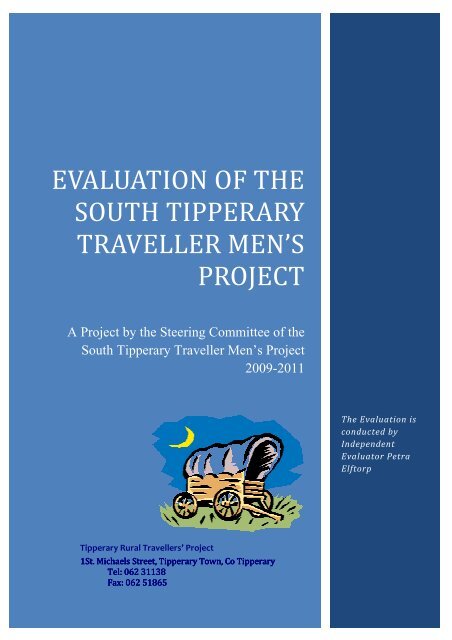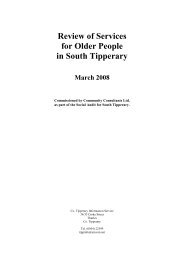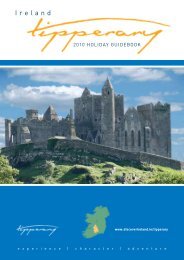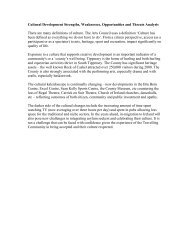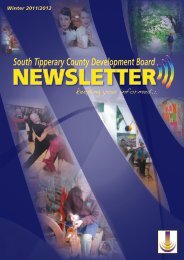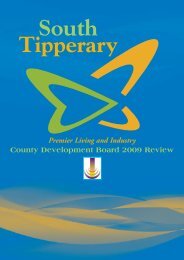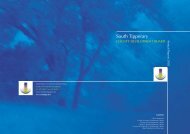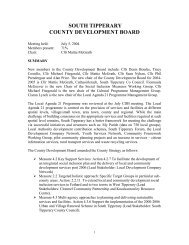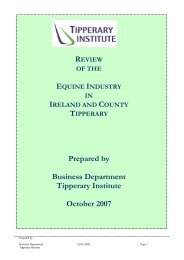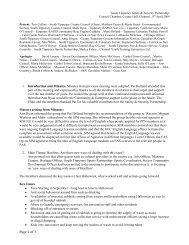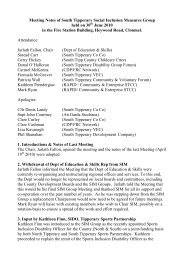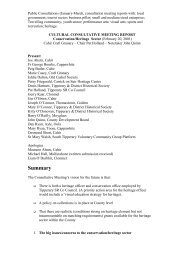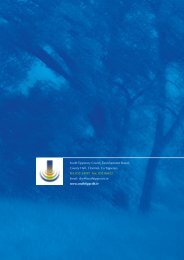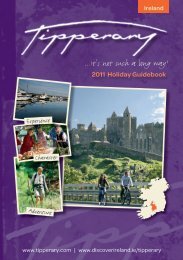evaluation of the south tipperary traveller men's project
evaluation of the south tipperary traveller men's project
evaluation of the south tipperary traveller men's project
You also want an ePaper? Increase the reach of your titles
YUMPU automatically turns print PDFs into web optimized ePapers that Google loves.
EVALUATION OF THE<br />
SOUTH TIPPERARY<br />
TRAVELLER MEN’S<br />
PROJECT<br />
A Project by <strong>the</strong> Steering Committee <strong>of</strong> <strong>the</strong><br />
South Tipperary Traveller Men’s Project<br />
2009-2011<br />
The Evaluation is<br />
conducted by<br />
Independent<br />
Evaluator Petra<br />
Elftorp<br />
Tipperary Rural Travellers’ Project<br />
1St. Michaels Street, Tipperary Town, Co Tipperary<br />
Tel: 062 31138<br />
Fax: 062 51865<br />
1
Chairpersons Address<br />
Margaret Casey (Chairperson <strong>of</strong> South Tipperary Traveller Men’s Steering<br />
Group and Co-ordinator <strong>of</strong> Tipperary Rural Traveller Project.)<br />
On behalf <strong>of</strong> Tipperary Rural Traveller Project, I would like to extend a<br />
heartfelt thanks to <strong>the</strong> great support that we have received from <strong>the</strong> different<br />
agencies on <strong>the</strong> steering committee. Without <strong>the</strong>ir support <strong>the</strong> outcomes from<br />
this <strong>project</strong> would not have been achieved.<br />
These include Clare Curley (South Tipperary County Council), Claire<br />
Grace (South Tipperary County Council), Paul Fearon (South East Men’s<br />
Network), Ann Ryan (South Tipperary County Council), Deidre<br />
Clancy(FAS), Kay Mullaney (South Tipperary VEC) and in particular<br />
Mary Roche (South Tipperary VEC) who has been a great supporter <strong>of</strong><br />
<strong>the</strong> <strong>project</strong> and who in her role has made a great contribution to <strong>the</strong><br />
Travelling Community in Clonmel.<br />
I would like to extend our appreciation to <strong>the</strong> Dept <strong>of</strong> Justice, Equality and<br />
Law Reform and Pobal for <strong>the</strong> opportunity to fund this worthwhile <strong>project</strong>. It<br />
gave us an opportunity to work with Traveller men to build <strong>the</strong>ir capacity in<br />
<strong>the</strong> community. Although it is early days and much work needs to be done<br />
much has been achieved to engage with and support <strong>the</strong> development <strong>of</strong><br />
Traveller men in South Tipperary over <strong>the</strong> last two years.<br />
Without <strong>the</strong> commitment <strong>of</strong> local agencies to match fund this <strong>project</strong> it<br />
would not have happened. I would like to acknowledge <strong>the</strong> huge<br />
commitment <strong>of</strong> South Tipperary VEC, Fionuala McGeever (CEO) and <strong>the</strong><br />
VEC’s Adult Education team to fund and co-ordinate a huge range <strong>of</strong> training<br />
for <strong>the</strong> Traveller men over <strong>the</strong> last two years especially in <strong>the</strong> area <strong>of</strong> literacy.<br />
Their creative approach to developing relevant and accessible training for<br />
<strong>the</strong> Traveller men needs to be commended. Many thanks also to Director <strong>of</strong><br />
Services, Sinead Carr, South Tipperary County Council who facilitated <strong>the</strong><br />
coordination <strong>of</strong> <strong>the</strong> Dept grant payments to us in TRTP and to Clare Curley,<br />
Director <strong>of</strong> Services in Housing, South Tipperary County Council for her<br />
commitment and matching funding allocated to <strong>the</strong> <strong>project</strong>. Many thanks<br />
also to <strong>the</strong> HSE for <strong>the</strong>ir matching funding contribution and to <strong>the</strong> ongoing<br />
support <strong>of</strong> Travellers in South Tipperary.<br />
I would also like to extend a thank you to all <strong>the</strong> voluntary Board <strong>of</strong><br />
management and staff <strong>of</strong> TRTP and in particular our administrator, Carol,<br />
who has put in immense work and a lot <strong>of</strong> time into administrating this<br />
Project.
I would like to extend a deep thanks to Eugene O’Donnell, <strong>the</strong> Traveller<br />
Men’s Development Worker. His commitment and interest in <strong>the</strong> men’s<br />
development has been a key factor in <strong>the</strong> success <strong>of</strong> <strong>the</strong> <strong>project</strong> and he<br />
quickly gained <strong>the</strong> trust <strong>of</strong> <strong>the</strong> Traveller Men who were happy to work closely<br />
with Eugene over <strong>the</strong> course <strong>of</strong> <strong>the</strong> <strong>project</strong>.<br />
I would like to thank <strong>the</strong> Evaluator <strong>of</strong> <strong>the</strong> <strong>project</strong>, Petra Elftorp for her time<br />
and <strong>the</strong> South Tipperary Volunteer service for identifying Petra as a volunteer<br />
for <strong>the</strong> <strong>evaluation</strong>.<br />
I am very pleased that we have developed and commenced a worthwhile<br />
piece <strong>of</strong> work with <strong>the</strong> Traveller men in our community. We are however still<br />
only at <strong>the</strong> start <strong>of</strong> a process and continued commitment is going to be<br />
required from all <strong>of</strong> us to ensure supports are in place to engage with and<br />
support <strong>the</strong> development <strong>of</strong> Traveller men in our community. This support<br />
will lead to real outcomes for <strong>the</strong> men, <strong>the</strong>ir families and <strong>the</strong> whole<br />
community. We have built many bridges, made many connections and have<br />
still lots <strong>of</strong> more work to do.<br />
Early in 2012, <strong>the</strong> steering committee will examine <strong>the</strong> recommendations <strong>of</strong><br />
this <strong>evaluation</strong> report and will hopefully begin <strong>the</strong> process <strong>of</strong> developing <strong>the</strong><br />
next plan for Traveller Men’s development in South Tipperary.<br />
I am looking forward to seeing <strong>the</strong> impacts <strong>of</strong> this work and <strong>the</strong> ongoing work<br />
with <strong>traveller</strong> men in <strong>the</strong> community over <strong>the</strong> coming years.<br />
Thanks again to all for <strong>the</strong>ir support.<br />
Mags Casey<br />
TRTP Co-ordinator
Summary<br />
The South Tipperary Traveller Men Project has been funded by Pobal on<br />
behalf <strong>of</strong> Dept <strong>of</strong> Justice, Equality and Law Reform with matching funding<br />
from o<strong>the</strong>r local agencies. Funding was allocated for a two year <strong>project</strong> which<br />
commenced in 2009 and which is now in its final stage in December 2011.<br />
The <strong>project</strong> was originally proposed as a reaction to <strong>the</strong> identified barriers to<br />
education and employment and lack <strong>of</strong> opportunities available to Traveller<br />
men in <strong>the</strong> county. The main barriers identified are: discrimination, low<br />
literacy and lack <strong>of</strong> education, low levels <strong>of</strong> employment and poor health.<br />
The Tipperary Rural Traveller Project (TRTP) is <strong>the</strong> operational lead<br />
organisation which co-ordinates <strong>the</strong> <strong>project</strong> on behalf <strong>of</strong> <strong>the</strong> lead agency,<br />
South Tipperary County Council. An interagency Steering group has been in<br />
place for <strong>the</strong> period <strong>of</strong> <strong>the</strong> <strong>project</strong> and has met on a very regular basis to direct<br />
and over see <strong>the</strong> <strong>project</strong>. The <strong>project</strong> Development Worker is <strong>the</strong> person who<br />
has conducted <strong>the</strong> outreach work and who continuously has interacted with<br />
<strong>the</strong> Traveller men on a weekly basis. The target groups for <strong>the</strong> <strong>project</strong> are <strong>the</strong><br />
core groups <strong>of</strong> Traveller men from <strong>the</strong> areas <strong>of</strong> Cashel, Cahir, Clonmel,<br />
Killenaule and Tipperary Town.<br />
The <strong>evaluation</strong> methods used are focus groups, interviews and questionnaire<br />
which have been conducted by an external evaluator, on a voluntary basis.<br />
The <strong>evaluation</strong> focuses on <strong>the</strong> experiences and opinions <strong>of</strong> <strong>the</strong> participating<br />
Traveller Men, but also <strong>the</strong> steering committee. The set objectives and <strong>the</strong><br />
views <strong>of</strong> <strong>the</strong> participants and <strong>of</strong> <strong>the</strong> steering committee have informed <strong>the</strong><br />
<strong>evaluation</strong> and from <strong>the</strong> findings, a number <strong>of</strong> recommendations have been<br />
made. The objectives set for <strong>the</strong> <strong>project</strong> are:<br />
1. To undertake outreach work with Traveller men throughout South<br />
Tipperary,<br />
2. To engage in Prior Learning with <strong>the</strong> Men<br />
3. To Provide Education and Support for Traveller men in South<br />
Tipperary<br />
4. To engage in Personal Development and Capacity Building with <strong>the</strong><br />
Men<br />
5. To undertake a Local Training Initiative in Year 3 and Year 4<br />
In order to achieve those objectives, a large number <strong>of</strong> Traveller men in <strong>the</strong><br />
county have been given <strong>the</strong> opportunity to partake in e.g. literacy classes,<br />
welding, wood work, fitness training and personal development. The <strong>project</strong><br />
is largely described as a success and while <strong>the</strong> barriers to education and<br />
employment still exist, this interagency <strong>project</strong> has certainly helped in<br />
breaking down parts <strong>of</strong> some <strong>of</strong> those barriers by giving <strong>the</strong> participating men
<strong>the</strong> opportunity to learn in an environment free from racism and<br />
discrimination.<br />
Abbreviations<br />
TRTP<br />
STCC<br />
VEC<br />
TIG<br />
RPL<br />
Tipperary Rural Traveller Project<br />
South Tipperary County Council<br />
Vocational Education Committee<br />
Traveller Interagency Group<br />
Recognition <strong>of</strong> Prior Learning
Table <strong>of</strong> Contents<br />
1. INTRODUCTION 1<br />
2. PROJECT BACKGROUND 2<br />
Local Context: Traveller Men in South Tipperary 2<br />
Barriers 3<br />
3. STRUCTURE & PROJECT OBJECTIVES 5<br />
4. EVALUATION METHODS 8<br />
5. PROJECT OUTCOMES 10<br />
5.1 Objectives 10<br />
5.2 Additional work carried out by <strong>the</strong> Development Worker 13<br />
5.3 Participants’ Perspectives 14<br />
6. OUTCOMES DISCUSSION 17<br />
6.1 Learning outcomes for <strong>the</strong> agencies 17<br />
6.2 Challenges 18<br />
6.3 Interagency Success 18<br />
6.4 Progression for Traveller Men in South Tipperary 19<br />
6.5 Where do we go from here 20<br />
7. CONCLUSIONS AND RECOMMENDATIONS 21<br />
REFERENCES 23<br />
APPENDIX: PHOTOS FROM THE PROJECT 24
1. Introduction<br />
The South Tipperary Traveller Men Project has been funded by Pobal on behalf <strong>of</strong> Dept <strong>of</strong><br />
Justice, Equality and Law Reform Pobal and o<strong>the</strong>r local agencies. Funding was allocated for a<br />
two year <strong>project</strong> which commenced in 2009 and which is now in its final stage in December<br />
2011. This document is an attempt to evaluate both <strong>the</strong> learning and <strong>the</strong> practical outcomes <strong>of</strong><br />
<strong>the</strong> <strong>project</strong>.<br />
The <strong>project</strong> was originally proposed as a reaction to <strong>the</strong> identified barriers to education and<br />
employment and lack <strong>of</strong> opportunities available to Traveller men in South Tipperary. A<br />
Steering Committee for <strong>the</strong> South Tipperary Traveller Men’s Project was established with <strong>the</strong><br />
main local service providers represented. It was <strong>the</strong> first time that an interagency group has<br />
worked toge<strong>the</strong>r on a <strong>project</strong> for Travellers in South Tipperary and this adds to <strong>the</strong><br />
significance <strong>of</strong> <strong>the</strong> <strong>evaluation</strong>. In addition to <strong>the</strong> positive outcomes for <strong>the</strong> participating<br />
Traveller men, <strong>the</strong> <strong>project</strong> is seen as a first step towards long-term working relationships<br />
between agencies and Travellers in South Tipperary.<br />
To describe <strong>the</strong> specific context <strong>of</strong> <strong>the</strong> <strong>project</strong>, <strong>the</strong> first section gives some background<br />
information and describes <strong>the</strong> most prevalent barriers. The structure, vision, objectives and<br />
important stakeholders <strong>of</strong> <strong>the</strong> <strong>project</strong> are <strong>the</strong>n presented. This is followed by a brief outline <strong>of</strong><br />
<strong>the</strong> <strong>evaluation</strong> and data collection methods.<br />
The participating Traveller men took part in evaluative group-discussions (focus groups)<br />
where <strong>the</strong>y expressed <strong>the</strong>ir views on <strong>the</strong> success and challenges <strong>of</strong> <strong>the</strong> <strong>project</strong>. Members in <strong>the</strong><br />
Steering group have also contributed with <strong>the</strong>ir particular perspectives through both a<br />
questionnaire and an evaluative discussion meeting. The findings from that data collection are<br />
presented, along with an outline <strong>of</strong> <strong>the</strong> progress on <strong>the</strong> <strong>project</strong> objectives.<br />
Finally, conclusions are drawn and a number <strong>of</strong> recommendations for <strong>the</strong> future are made in<br />
<strong>the</strong> hope that <strong>the</strong> successes <strong>of</strong> <strong>the</strong> <strong>project</strong> can be built upon and essentially, that various<br />
aspects <strong>of</strong> Traveller men’s lives will be improved.<br />
1
2. Project Background<br />
The South Tipperary Traveller Men’s Project is run by a Steering Committee made up <strong>of</strong> a<br />
number <strong>of</strong> different agencies. It received funding from <strong>the</strong> HSE, South Tipperary County<br />
Council, Tipperary Rural Traveller Project, Pobal as well as funding in kind from South<br />
Tipperary VEC. The <strong>project</strong> started in 2009 and has been running for <strong>the</strong> past two years and is<br />
now coming to an end. The background and <strong>the</strong> rationale for <strong>the</strong> <strong>project</strong> are outlined below.<br />
Local Context: Traveller Men in South Tipperary<br />
As <strong>the</strong> lead operational agency for this <strong>project</strong>, <strong>the</strong> Tipperary Rural Traveller Project (TRTP)<br />
is an organisation which aims to improve living conditions for Travellers in <strong>the</strong> county. In<br />
South Tipperary, <strong>the</strong>re are approximately 147 Traveller families. Traveller women and<br />
Traveller youth have been participating increasingly in education, community programmes<br />
and initiatives in South Tipperary. However, Traveller men have not taken part in those<br />
activities to <strong>the</strong> same extent and this has also been noted by South Tipperary VEC and o<strong>the</strong>r<br />
agencies and service providers working in <strong>the</strong> area. They identified a lack <strong>of</strong> opportunities and<br />
also a number <strong>of</strong> social barriers which prevent Traveller men from participating in areas such<br />
as education and employment.<br />
In a large study called ‘All Ireland Traveller Health Study’ (2010), health and living<br />
conditions <strong>of</strong> Travellers were reported. It states that while <strong>the</strong> health <strong>of</strong> settled men in Ireland<br />
has improved since 1987, no improvements have taken place for Traveller men, who have a<br />
life expectancy <strong>of</strong> 62 years, compared to 77 years for settled men.<br />
According to TRTP, Traveller men were not engaging with <strong>the</strong> service providers in South<br />
Tipperary to <strong>the</strong> same extent as Traveller women or youth and this is seen as a serious threat<br />
not only to <strong>the</strong> wellbeing <strong>of</strong> Traveller men, but also <strong>the</strong> wider Traveller Community. It is<br />
recognised that women from minority communities will engage first and that <strong>the</strong> men follow.<br />
Traveller girls also tend to stay in school longer than Traveller Boys which has serious<br />
impacts on <strong>the</strong>ir education. The local Traveller Interagency Group acknowledged <strong>the</strong> barriers<br />
that Traveller men face, <strong>the</strong> lack <strong>of</strong> opportunities available to <strong>the</strong>m, and <strong>the</strong> gap between<br />
Traveller men and <strong>the</strong> service providers. Fur<strong>the</strong>rmore, Traveller men were not taking up what<br />
is considered mainstream employment opportunities within South Tipperary.<br />
Many reports have highlighted concerns in relation to mental health issues and drug misuse<br />
amongst Travellers in Ireland, and South Tipperary is not an exception. A lack <strong>of</strong><br />
opportunities and o<strong>the</strong>r social barriers continue to enforce inequality and social exclusion and<br />
this <strong>project</strong> is an attempt to improve <strong>the</strong> living conditions by increasing literacy levels,<br />
personal development and essentially build a relationship between <strong>the</strong> Traveller Community<br />
and local service providers. The South Tipperary Traveller Men’s Project was seen as an<br />
opportunity and a starting point for Traveller men to take a more proactive role in <strong>the</strong>ir own<br />
lives.<br />
2
Barriers<br />
Before <strong>the</strong> <strong>project</strong> was initiated, barriers were identified in relation to Traveller men in South<br />
Tipperary engaging with mainstream services, including education, employment and support<br />
services. Both Traveller men and <strong>the</strong> local agencies/service providers took part in identifying<br />
<strong>the</strong> barriers and <strong>the</strong>y found that Travellers in South Tipperary face <strong>the</strong> same barriers that<br />
impact on Travellers in o<strong>the</strong>r parts <strong>of</strong> Ireland.<br />
Discrimination<br />
Discrimination <strong>of</strong> Travellers is present on individual and interpersonal level and at an<br />
institutional level and is affecting Travellers in <strong>the</strong>ir day to day life. On an individual level,<br />
discrimination is most common in relation to accessing facilities or services. Many Travellers<br />
face discrimination on an institutional level too, where procedures and policies reflect a lack<br />
<strong>of</strong> understanding and acceptance <strong>of</strong> Travellers' culture and identity. The discrimination may<br />
be ei<strong>the</strong>r direct or indirect and with or without intent. None<strong>the</strong>less, any form <strong>of</strong> discrimination<br />
is damaging. A negative stereotyping <strong>of</strong> Travellers <strong>of</strong>ten lead to negative self-perception and<br />
self-esteem which in turn may lead to poor mental health or increased substance abuse.<br />
Discrimination as a barrier needs to be recognised to allow for appropriate actions to be taken.<br />
Low Literacy and Lack <strong>of</strong> Education<br />
There are numerous figures and statistics that describe <strong>the</strong> vast difference between Travellers<br />
and settled people, in relation to education. According to <strong>the</strong> 2006 census, 63.2% <strong>of</strong> Traveller<br />
children under <strong>the</strong> age <strong>of</strong> 15 had left school, compared to 13.3% nationally. The reasons<br />
behind <strong>the</strong>se figures are debatable. The advantages with having formal education may be<br />
difficult to see for Travellers, especially so when your peers or parents have poor literacy.<br />
Literacy and numeracy are core skills which must be attained before fur<strong>the</strong>r learning can take<br />
place. Low literacy level is a huge barrier to accessing information and services. The<br />
Traveller men targeted for this <strong>project</strong> had literacy levels which varied from none to poor. The<br />
lack <strong>of</strong> education amongst Traveller men also has <strong>the</strong> implication that many Travellers do not<br />
feel comfortable accessing education services such as <strong>the</strong> VEC.<br />
More than half <strong>of</strong> <strong>the</strong> recommendations made by <strong>the</strong> 1995 Task Force Report on <strong>the</strong><br />
Travelling Community related to education. Several <strong>of</strong> <strong>the</strong> recommendations focused on <strong>the</strong><br />
need to engage with <strong>the</strong> parents and some focused on <strong>the</strong> potential <strong>of</strong> interagency work.<br />
Some, but not all, <strong>of</strong> those recommendations have been followed, however, as <strong>the</strong> majority <strong>of</strong><br />
<strong>the</strong> men in this <strong>project</strong> are over 18, <strong>the</strong>y are likely to have experienced huge disadvantage in<br />
relation to education.<br />
While lack <strong>of</strong> education is a barrier for adults, <strong>the</strong>re are also “sub-barriers” to accessing adult<br />
education, such as lack <strong>of</strong> childcare provision, lack <strong>of</strong> resources and funds for school material,<br />
difficult entry requirements and transport.<br />
3
Low levels <strong>of</strong> Employment<br />
Very few Travellers are in mainstream employment. In <strong>the</strong> 2006 census <strong>the</strong> rate <strong>of</strong><br />
employment among Travellers aged over 15 years was 14%. Travellers face discrimination<br />
when looking for work and <strong>the</strong> low literacy levels and lack <strong>of</strong> education is an obvious barrier<br />
to gaining employment as almost all jobs in today’s society require at least a basic level <strong>of</strong><br />
literacy. Additionally, some work areas that are traditionally associated with Travellers are<br />
now increasingly difficult to find, e.g. recycling, waste disposal and horse trading.<br />
Factors that lead to low levels <strong>of</strong> participation in employment by Travellers have been<br />
identified in <strong>the</strong> All Ireland Traveller Health Study (2010):<br />
• Lack <strong>of</strong> understanding and recognition <strong>of</strong> <strong>the</strong> specific Traveller culture.<br />
• Lack <strong>of</strong> outreach efforts to recruit Travellers<br />
• Lack <strong>of</strong> recruitment procedures which meet <strong>the</strong> needs <strong>of</strong> Travellers.<br />
• Lack <strong>of</strong> supports such as childcare.<br />
• Fear <strong>of</strong> losing welfare and/or o<strong>the</strong>r benefits.<br />
Poor Health<br />
Poor health is perhaps a result <strong>of</strong> o<strong>the</strong>r barriers and social determinants, such as<br />
discrimination, low levels <strong>of</strong> literacy and lifestyle. According to <strong>the</strong> ‘All Ireland Traveller<br />
Health Study’, suicide rates in male Travellers is 6.6 times higher than in <strong>the</strong> general<br />
population and accounts for 11% <strong>of</strong> Traveller deaths. Depression is still somewhat a taboo<br />
topic within <strong>the</strong> Traveller community and mental health issues are prevalent.<br />
A holistic approach<br />
As a result <strong>of</strong> <strong>the</strong>se barriers being identified, <strong>the</strong> <strong>project</strong> objectives were shaped. The strengths<br />
<strong>of</strong> <strong>the</strong> <strong>project</strong> may indeed be that <strong>the</strong> objectives are not purely educational or not purely health<br />
related. There are personal, educational and vocational aspects to <strong>the</strong> <strong>project</strong> which allows for<br />
a more holistic approach to such a complex set <strong>of</strong> barriers. Please see next section for an<br />
outline <strong>of</strong> <strong>the</strong> <strong>project</strong> structure and objectives.<br />
4
3. Structure & Project Objectives<br />
The Tipperary Rural Traveller Project is <strong>the</strong> Operational lead organisation which co-ordinates<br />
<strong>the</strong> <strong>project</strong> on behalf <strong>of</strong> <strong>the</strong> Lead Agency, South Tipperary County Council who had<br />
nominated members <strong>of</strong> <strong>the</strong>ir staff on to <strong>the</strong> steering group <strong>of</strong> <strong>the</strong> <strong>project</strong>. The <strong>project</strong><br />
Development Worker reports back regularly to <strong>the</strong> Project Coordinator and Voluntary Board<br />
<strong>of</strong> Management <strong>of</strong> TRTP, South Tipperary Traveller Men’s Steering Committee and <strong>the</strong><br />
South Tipperary Traveller Interagency Group which in turn report to South Tipperary Social<br />
Inclusion Measures Group. The target groups for <strong>the</strong> <strong>project</strong> are <strong>the</strong> core groups <strong>of</strong> Traveller<br />
men from <strong>the</strong> areas <strong>of</strong> Cashel, Cahir, Clonmel, Killenaule and Tipperary Town.<br />
The South Tipperary Interagency Group is a group involving all <strong>the</strong> different agencies in<br />
South Tipperary that have <strong>the</strong> Travelling Community as <strong>the</strong>ir target group. Agencies that are<br />
involved include: South Tipperary County Council and Clonmel Borough Council,<br />
Knockanrawley/Millenium/Spafield Resource Centres, County Childcare Committee,<br />
Department <strong>of</strong> Social Protection, HSE, VEC, Gardai, Men’s Network, South Tipperary<br />
Development Company, Tipperary Regional Youth Service, National Education Welfare<br />
Board, Clonmel Youth Training Enterprise, South Tipperary Sports Partnership, MABS,<br />
Social Welfare and Tipperary Libraries.<br />
5
Steering Committee<br />
The steering committee’s role is to oversee <strong>the</strong> <strong>project</strong>. It is made up <strong>of</strong> a number <strong>of</strong> agencies<br />
that work with Traveller men in South Tipperary.<br />
Margret Casey - Tipperary Rural Traveller Project – Operational Lead Partners<br />
Clare Curley – Director <strong>of</strong> Services, South Tipperary County Council<br />
Claire Grace- Social worker for Travellers for South Tipperary County Council<br />
Mai Gillman- Public Health Nurse for Travellers for <strong>the</strong> HSE<br />
Mary Roche – Adult Literacy Organiser with <strong>the</strong> VEC<br />
Kaye Mullaney – Back to Education Coordinator<br />
Ellen/Ann O Reilly– South Tipperary Development Company<br />
Paul Fearon – Men’s Development Network<br />
A member from an Gardai<br />
Ann Ryan – Administrator with South Tipperary County Council<br />
Deidre Clancy – FAS<br />
Project Vision<br />
The following vision for <strong>the</strong> <strong>project</strong> is stated in <strong>the</strong> Project Plan:<br />
“South Tipperary Traveller Men’s Project promotes <strong>the</strong> empowerment<br />
<strong>of</strong> Traveller men at every level to negotiate and create <strong>the</strong>ir own<br />
solutions to <strong>the</strong> issues that affect <strong>the</strong>ir lives on a daily basis.”<br />
Project Objectives and Anticipated Long Term Outcomes<br />
These are <strong>the</strong> 4 objectives <strong>of</strong> <strong>the</strong> South Tipperary Traveller Men Project, stated in <strong>the</strong> Project<br />
Plan, 2009:<br />
1. To undertake outreach work with Traveller men throughout South Tipperary<br />
2. To engage in Prior Learning with <strong>the</strong> Men<br />
3. To Provide Education and Support for Traveller men in South Tipperary<br />
4. To engage in Personal Development and Capacity Building with <strong>the</strong> Men<br />
6
Alongside this, a core part should consist <strong>of</strong> <strong>the</strong> development <strong>of</strong> leadership skills, personal<br />
development, capacity building, negotiation skills and Group Dynamics.<br />
These are <strong>the</strong> anticipated long term outcomes, as stated in <strong>the</strong> Project Plan, 2009:<br />
• Traveller men will be actively involved in dealing with issues that affect <strong>the</strong>ir lives<br />
• Traveller men will have increased opportunity for meaningful employment<br />
• Increase <strong>the</strong> number <strong>of</strong> Traveller men in South Tipperary in Training and Employment<br />
• Traveller men will participate in decision making processes that affect <strong>the</strong>ir lives<br />
• Traveller economy will gain recognition and value within Irish society as a whole<br />
• 5-7 Traveller Men in strong Leadership positions within <strong>the</strong> community<br />
• The employment and training aspirations <strong>of</strong> Traveller men will be developed and<br />
responded to in an appropriate way<br />
• Traveller men will develop significant tools to assist <strong>the</strong>m in ensuring that <strong>the</strong> Project is<br />
sustainable by <strong>the</strong> Traveller community into <strong>the</strong> Future<br />
• Development <strong>of</strong> a Boxing club in Cahir<br />
It is also stated in <strong>the</strong> Project Plan that in order “to ensure sustainability and progression into<br />
meaningful employment, a Local Training Initiative will have to be started in Year 3 and year<br />
4 building on <strong>the</strong> participants existing skills”.<br />
Identifying stakeholders and Partnerships<br />
The following agencies were identified as stakeholders <strong>of</strong> this <strong>project</strong>:<br />
• Men’s Development Network: Working with Traveller Men in South Tipperary fulfilling <strong>the</strong>ir<br />
commitment to work at a regional level.<br />
• FAS: Involvement in <strong>the</strong> Prior Learning and <strong>the</strong> establishment <strong>of</strong> an LTI with <strong>the</strong> focus on Progression<br />
into Employment.<br />
• South Tipperary VEC: Providing adult literacy and numeracy tuition, Committee Skills classes, E-<br />
learning classes, Personal Development classes, FETAC accreditation options and Adult Education<br />
Guidance to Traveller men.<br />
• Gardai: Engaging with Traveller men on a different level to <strong>the</strong>ir “normal” engagement.<br />
• DSFA: Engaging with <strong>the</strong> Men in Training and Education and participating in FAS, <strong>the</strong> LTI in year 3<br />
and working closer with <strong>the</strong> Men to disengage <strong>the</strong>m from <strong>the</strong>ir dependency on social welfare.<br />
• HSE: Very strong Health element in <strong>the</strong> Project, also supportive <strong>of</strong> <strong>the</strong> Health work being carried out<br />
with Traveller women in <strong>the</strong> Country.<br />
7
4. Evaluation methods<br />
The <strong>evaluation</strong> method used is a summative, participant-oriented, <strong>evaluation</strong> <strong>the</strong> focus <strong>of</strong><br />
which was on <strong>the</strong> experiences and opinions <strong>of</strong> <strong>the</strong> main stakeholders <strong>of</strong> <strong>the</strong> <strong>project</strong>, namely<br />
<strong>the</strong> participating Traveller men, but also <strong>the</strong> Steering Committee and all <strong>the</strong> identified<br />
stakeholders.<br />
The evaluator is external and has not been a part <strong>of</strong> <strong>the</strong> <strong>project</strong> o<strong>the</strong>r than during <strong>the</strong> past few<br />
months with <strong>the</strong> objective to evaluate <strong>the</strong> <strong>project</strong>. No conflicts <strong>of</strong> interests exist as <strong>the</strong><br />
evaluator is conducting <strong>the</strong> work on a voluntary basis and has no bias towards any <strong>of</strong> <strong>the</strong><br />
stakeholders.<br />
No names <strong>of</strong> <strong>the</strong> participating Traveller men have been recorded as <strong>the</strong>y are to remain<br />
anonymous. Anonymity <strong>of</strong> <strong>the</strong> members <strong>of</strong> <strong>the</strong> steering group can however not be guaranteed<br />
as <strong>the</strong>y are representing different agencies which can be identifiable.<br />
Data Collection<br />
The following data collection methods have been used:<br />
• Review <strong>of</strong> <strong>project</strong> documentation<br />
This was necessary as I, as an evaluator, am an outsider who did not have pre-existing<br />
knowledge <strong>of</strong> <strong>the</strong> <strong>project</strong>, as I have not been part <strong>of</strong> any <strong>of</strong> <strong>the</strong> agencies. The initial <strong>project</strong><br />
plan provided information about <strong>the</strong> background and context <strong>of</strong> <strong>the</strong> <strong>project</strong> and <strong>the</strong> Steering<br />
group meeting protocols have provided some information about <strong>the</strong> on-going process. The<br />
<strong>project</strong> reports written by <strong>the</strong> development worker to Pobal have also given me a better<br />
understanding <strong>of</strong> <strong>the</strong> continuous work <strong>of</strong> <strong>the</strong> development worker and <strong>the</strong> participants.<br />
• Focus groups with groups <strong>of</strong> participating Traveller Men:<br />
The participating Traveller men took part in focus groups where <strong>the</strong>y were asked to discuss<br />
positive and negative aspects <strong>of</strong> <strong>the</strong> <strong>project</strong>. It was <strong>the</strong> first time that <strong>the</strong>y met <strong>the</strong> evaluator<br />
and <strong>the</strong>y were informed that <strong>the</strong>ir identity would not be recorded. The focus groups took place<br />
in <strong>the</strong> various locations where <strong>the</strong>y would normally meet for <strong>the</strong>ir literacy and computer<br />
classes to ensure that <strong>the</strong>y were in a familiar setting. The focus group sessions were recorded,<br />
which <strong>the</strong> Traveller men were informed <strong>of</strong> and consented to.<br />
• Questionnaire to <strong>the</strong> Steering Group members:<br />
A questionnaire with open ended questions was emailed to all members <strong>of</strong> <strong>the</strong> steering group,<br />
in which <strong>the</strong>y were asked to discuss initial expectations, positive aspects, challenges and what<br />
direction <strong>the</strong>y would like to see <strong>the</strong> <strong>project</strong> taking in <strong>the</strong> future. All members responded.<br />
8
• Interviews with Development Worker, Coordinator <strong>of</strong> <strong>the</strong> Tipperary Rural<br />
Traveller Project and a Literacy Tutor:<br />
Informal interviews with above mentioned persons helped inform <strong>the</strong> <strong>evaluation</strong> on a number<br />
<strong>of</strong> issues, such as <strong>the</strong> context <strong>of</strong> <strong>the</strong> <strong>project</strong>, <strong>the</strong>ir role and <strong>the</strong> learning progression <strong>of</strong> <strong>the</strong><br />
Traveller Men. The development worker was also very helpful in answering questions in<br />
relation to <strong>the</strong> <strong>project</strong> outcomes.<br />
• An evaluative discussion meeting with <strong>the</strong> steering group members:<br />
A meeting was held where I asked open ended evaluative questions regarding learning<br />
outcomes for <strong>the</strong> agencies involved, successful aspects, barriers identified in relation to<br />
working with Traveller Men and also how to build on <strong>the</strong> learning and how to progress into<br />
<strong>the</strong> future.<br />
9
5. Project Outcomes<br />
The outcomes <strong>of</strong> <strong>the</strong> <strong>project</strong> are described in this section. An overview <strong>of</strong> <strong>the</strong> work done in<br />
relation to each objective is presented and is <strong>the</strong>n followed by <strong>the</strong> participating Traveller men<br />
giving <strong>the</strong>ir perspective <strong>of</strong> <strong>the</strong> <strong>project</strong>. Please see Appendix A for photos taken during <strong>the</strong><br />
<strong>project</strong>.<br />
5.1 Objectives<br />
Objective 1: To undertake outreach work<br />
The following description <strong>of</strong> <strong>the</strong> outreach work which has taken place during <strong>the</strong> past two years is<br />
written by <strong>the</strong> Development worker:<br />
• Trust has been developed between <strong>the</strong> Development worker and <strong>the</strong> Men and between <strong>the</strong> men<br />
and different services such as Tipperary Rural Traveller Project and South Tipperary VEC.<br />
• A strong relationship has been built between <strong>the</strong> Development worker and <strong>the</strong> men which has led<br />
<strong>the</strong> men to talk to <strong>the</strong> worker around different issues like mental health, accommodation etc. The<br />
worker has in turn supported <strong>the</strong> men with <strong>the</strong>ir issues and linked <strong>the</strong>m to o<strong>the</strong>r services over <strong>the</strong><br />
two years <strong>of</strong> <strong>the</strong> Programme.<br />
• South Tipperary Travellers Men’s Project and relevant agencies have a better understanding <strong>of</strong> <strong>the</strong><br />
needs <strong>of</strong> Traveller Men<br />
• A programme was put in place to address identified needs <strong>of</strong> Traveller Men which ensures greater<br />
retention <strong>of</strong> participants and increased opportunities for Traveller men to engage in fur<strong>the</strong>r<br />
education and training.<br />
• 40 Traveller Men have engaged in adult Education and Training over <strong>the</strong> 2 years<br />
• 50 Traveller Men have been aware <strong>of</strong> <strong>the</strong> services available and throughout <strong>the</strong> 2 years have<br />
accessed <strong>the</strong> <strong>project</strong> in some format.<br />
• Agencies have made good use <strong>of</strong> <strong>the</strong> <strong>project</strong> to raise awareness <strong>of</strong> <strong>the</strong>ir services.<br />
• The Development Worker has been a link between Traveller Men and <strong>the</strong> Service Providers,<br />
increasing <strong>the</strong> opportunity for services to assess how <strong>the</strong>ir service can relate to Travellers and<br />
specifically Traveller Men.<br />
• 50 Traveller Men have an increased sense <strong>of</strong> ownership <strong>of</strong> <strong>the</strong> Men’s Project<br />
Objective 2: To engage in <strong>the</strong> Recognition <strong>of</strong> Prior Learning (RPL)<br />
This objective was set early and was later found to be inappropriate. When <strong>the</strong> development<br />
worker and <strong>the</strong> VEC had gained a better understanding <strong>of</strong> <strong>the</strong> literacy levels among <strong>the</strong><br />
Traveller men, it was decided that this objective would not be achievable during <strong>the</strong> time<br />
period set for <strong>the</strong> <strong>project</strong>:<br />
10
“RPL is identified by <strong>the</strong> VEC as being <strong>of</strong> a higher level when a lot <strong>of</strong> <strong>the</strong><br />
generic skills such as Literacy/Numeracy and Computer Literacy are <strong>of</strong> an<br />
adequate standard to allow <strong>the</strong> learner to progress onto an accredited course<br />
such as FETAC level 5” (development worker)<br />
It was noted that many <strong>of</strong> <strong>the</strong> Traveller men had difficulties with accredited learning as <strong>the</strong>y<br />
were not ready to follow a set syllabus with time constraints. Community Education was seen<br />
as better suited as <strong>the</strong> syllabus was set by <strong>the</strong>mselves which allowed <strong>the</strong>m to focus on basic<br />
literacy/numeracy and computer skills. RPL is expected to take place when <strong>the</strong> progression <strong>of</strong><br />
<strong>the</strong> participants is at a suitable level and when courses <strong>of</strong> <strong>the</strong>ir interests have been identified.<br />
However Personal learning plans were developed for <strong>the</strong> men outlining <strong>the</strong>ir interests,<br />
experience and education and what <strong>the</strong>y hoped to get from <strong>the</strong> <strong>project</strong>. Each <strong>of</strong> <strong>the</strong> men has a<br />
portfolio representing <strong>the</strong>ir skills, knowledge and competences in particular fields.<br />
Objective 3: To Provide Education and Support<br />
The development worker has summarised <strong>the</strong> various activities related to education, support<br />
and sport:<br />
• 50 Traveller Men have participated in Literacy and Numeracy, Computer Literacy and/or Health<br />
and Fitness Classes<br />
• Measurable progress in Literacy and Numeracy skills for 40 Traveller Men<br />
• 50 Traveller men have engaged with local service providers e.g. VEC, FAS, HSE, S.T. Sports<br />
Partnership, South Tipperary County Council<br />
• 5 men from Cashel received certificates in Level 3 welding<br />
• 8 men from Killenaule received certificates in Level 3 welding<br />
• A group <strong>of</strong> Cashel and Clonmel men were involved in woodwork classes where various objects<br />
were made such as dog boxes, chicken hatches and c<strong>of</strong>fee tables. They were also engaged in <strong>the</strong><br />
restoring <strong>of</strong> horse trailers and small trailers.<br />
• Driver Theory Test instruction and literacy is being carried out on an individual basis with <strong>the</strong><br />
men in Tipperary Town<br />
• There has been a Measurable increase in personal fitness levels and understanding <strong>of</strong> <strong>the</strong><br />
importance <strong>of</strong> warm up, cool down and lifting weights among Traveller Men<br />
• 2 men received <strong>the</strong>ir Theory test in driving. A fur<strong>the</strong>r 5 men are being helped to achieve <strong>the</strong>ir<br />
Provisional License.<br />
• 3 men passed <strong>the</strong>ir full driving license<br />
11
Objective 4: To engage Traveller Men in Personal Development and Capacity Building<br />
Again, <strong>the</strong> development worker has outlined <strong>the</strong> work undertaken with <strong>the</strong> aim to increase<br />
personal development and capacity building.<br />
• 40 Traveller Men have participated in Sports Activities on a weekly basis. This has varied from<br />
Gym activities, swimming, handball and included soccer.<br />
• 20 Traveller Men have undergone a Medical Check with <strong>the</strong>ir GP<br />
• 12 men from <strong>the</strong> Cashel area were involved in <strong>the</strong> making <strong>of</strong> a stone table for <strong>the</strong> EU charter<br />
weekend in Cashel 2011. This was done in conjunction with Philip Quinn <strong>of</strong> Stonemad.ie. Over<br />
<strong>the</strong> course <strong>of</strong> <strong>the</strong> weekend different delegates and <strong>the</strong> public were involved in designing and<br />
constructing <strong>the</strong> Table along with <strong>the</strong> artist and <strong>the</strong> men.<br />
• 20 Traveller men have engaged in a Capacity Development/Practical Education programs called<br />
<strong>the</strong> Sulky Program. Short inputs were integrated into <strong>the</strong> sessions in relation to capacity building<br />
around Leadership, health and safety which was carried out by Bernard O’ Connor in <strong>the</strong><br />
workshop, team work and personal development.<br />
• 8 men from Killeanaule were involved in a 10 week stone carving course<br />
• 6 men from <strong>the</strong> Clonmel area and two from Cashel progressed onto caretaker training to become<br />
caretakers <strong>of</strong> <strong>the</strong>ir sites. This progression would not have been possible were it not for <strong>the</strong> men’s<br />
<strong>project</strong> in which <strong>the</strong> men were involved in.<br />
• 2 <strong>of</strong> <strong>the</strong> groups went on a Day trip. This provided a chance to build on <strong>the</strong> relationship with <strong>the</strong><br />
men and provided a chance for group building<br />
• Workshops were also carried out with Thomas McCann <strong>of</strong> <strong>the</strong> Pilot Counselling Service in Dublin<br />
along with Martin Collins <strong>of</strong> Pavee Point around Traveller Culture, mental health as well as<br />
discrimination and racism.<br />
• Tommy Fitzgerald who is a qualified counsellor and working in <strong>the</strong> area <strong>of</strong> addiction with<br />
Travellers also met <strong>the</strong> men and discussed addiction with <strong>the</strong>m.<br />
• The men were involved in setting up a handball club. They learnt about <strong>the</strong> different roles <strong>of</strong> a<br />
club and what is involved. They improved <strong>the</strong>ir communication and leadership skills in <strong>the</strong><br />
process.<br />
• A group <strong>of</strong> Men were also involved in A DIY <strong>project</strong> where <strong>the</strong>y received training in carpentry<br />
and plumbing. They worked on renovating an old building.<br />
• All <strong>of</strong> <strong>the</strong> men that engaged with <strong>the</strong> Project received 1/1 support where it was needed.<br />
12
5.2 Additional work carried out by <strong>the</strong> Development Worker<br />
• Meetings took place on a regular basis with <strong>the</strong> VEC tutors that worked on <strong>the</strong> Project<br />
around planning, engagement as well as a number <strong>of</strong> different issues that arose over<br />
<strong>the</strong> course <strong>of</strong> <strong>the</strong> Project.<br />
• Meetings also took place on a regular basis with <strong>the</strong> various agencies that worked with<br />
<strong>the</strong> men such as Claire Grace, a social worker with <strong>the</strong> county council, and Mary<br />
Roche, <strong>the</strong> Adult Literacy Organiser around Education in <strong>the</strong> VEC.<br />
• Numerous meetings were attended over <strong>the</strong> course <strong>of</strong> <strong>the</strong> Project which impacted on<br />
<strong>the</strong> work <strong>of</strong> <strong>the</strong> Project. These included <strong>the</strong> Traveller Men’s Regional Health meetings<br />
held in Waterford where a precedent was set at a regional level in terms <strong>of</strong> engaging<br />
with Traveller men. Meetings in Pavee Point around Men’s Health as well as attending<br />
meetings <strong>of</strong> <strong>the</strong> South Tipperary Advisory Committee on Substance Misuse which<br />
examined mental health issues in <strong>the</strong> Travelling Community. This advisory committee<br />
was set up as a result <strong>of</strong> <strong>the</strong> work that was ongoing with <strong>the</strong> men by <strong>the</strong> Development<br />
Worker who had developed a relationship with <strong>the</strong>m and was aware <strong>of</strong> <strong>the</strong> need for<br />
more specific work in <strong>the</strong> area <strong>of</strong> addiction.<br />
• Meetings were held with <strong>the</strong> Coordinator <strong>of</strong> T.R.T.P on a weekly basis discussing<br />
various issues that arose in <strong>the</strong> Project over <strong>the</strong> two years. The Development worker<br />
also attended various team meetings with <strong>the</strong> staff <strong>of</strong> T.R.T.P. and was also involved<br />
in staff supervision meetings with <strong>the</strong> voluntary Board <strong>of</strong> Management <strong>of</strong> T.R.T.P.<br />
• The Development Worker also worked with <strong>the</strong> Traveller FAS Enterprise and<br />
Development workers in linking <strong>the</strong> men from <strong>the</strong> different areas in with <strong>the</strong> service<br />
being provided and in planning a Local Training Initiative for <strong>the</strong> men which would<br />
have been a progression for a number <strong>of</strong> <strong>the</strong> men.<br />
• He also worked with a number <strong>of</strong> Traveller men who had been granted early release<br />
from prison. This involved one-on-one support and ensured that any difficulties <strong>the</strong>y<br />
had were being worked upon.<br />
• Numerous <strong>of</strong>fice duties were carried out over <strong>the</strong> two years <strong>of</strong> <strong>the</strong> Project. To give<br />
some examples, this work involved making phone calls, helping <strong>the</strong> men to set up<br />
appointments, writing reports, supporting <strong>the</strong> men to write letters to different agencies,<br />
booking venues and arranging transport.<br />
• Publicity was gained for <strong>the</strong> Project through <strong>the</strong> development worker being on local<br />
radio and <strong>the</strong> writing <strong>of</strong> various newspaper articles highlighting <strong>the</strong> men’s<br />
achievements.<br />
• Funding was also secured from <strong>the</strong> HSE for 2012 to continue <strong>the</strong> work in relation to<br />
improving Traveller men’s health. This funding was secured due to <strong>the</strong> work <strong>of</strong> <strong>the</strong><br />
South Tipperary Traveller Men’s Project<br />
• A Local training Initiative has also been secured that will progress <strong>the</strong> work that has<br />
been achieved with Traveller Men.<br />
13
5.3 Participants’ Perspectives<br />
Group interviews (focus groups) have been conducted with <strong>the</strong> participating Traveller men<br />
and <strong>the</strong>ir views on <strong>the</strong> <strong>project</strong> are described below. The groups were asked to express and<br />
discuss <strong>the</strong>ir experiences, which gives us a better insight into what this <strong>project</strong> has meant to<br />
<strong>the</strong> individuals who took part in it.<br />
To stay as true as possible to <strong>the</strong> reflections and opinions <strong>of</strong> <strong>the</strong> Traveller Men, I have chosen<br />
to use <strong>the</strong>ir own words to a large extent when reporting on <strong>the</strong>ir perspectives <strong>of</strong> <strong>the</strong> <strong>project</strong>.<br />
What did you expect from <strong>the</strong> <strong>project</strong> initially<br />
The Traveller men expressed how <strong>the</strong> trust in <strong>the</strong> group was important and that <strong>the</strong> fact that<br />
<strong>the</strong>y felt equal and safe with each o<strong>the</strong>r’s company was central to <strong>the</strong>m taking part in <strong>the</strong><br />
<strong>project</strong>:<br />
Coming in here first was difficult. But we were all toge<strong>the</strong>r and in here<br />
we’re all equal. More <strong>of</strong> us were excited about going but some were<br />
anxious.<br />
It was nice to know I wasn’t <strong>the</strong> only one that couldn’t read properly.<br />
We’re only all learning here. All toge<strong>the</strong>r. There’s no one here to say<br />
how bad we are ‘cause we’re only here with each o<strong>the</strong>r you know.<br />
In relation to specific learning outcomes, <strong>the</strong> Traveller men were unsure what to expect and<br />
were more excited about getting an opportunity to learn in a safe and local setting. Some said<br />
that <strong>the</strong>y decided to give it a try as <strong>the</strong>re was nothing else for <strong>the</strong>m to do, but that <strong>the</strong>y did not<br />
expect <strong>the</strong> <strong>project</strong> to be as beneficial as it has been.<br />
Did you feel that your opinions were heard<br />
When asked if <strong>the</strong>y felt that <strong>the</strong>y had an input and if <strong>the</strong>ir voice was heard regarding <strong>the</strong><br />
formation <strong>of</strong> <strong>the</strong> <strong>project</strong> objectives, one person answered:<br />
He [<strong>the</strong> development worker] asked what we were interested in.<br />
O<strong>the</strong>rwise we probably wouldn’t have joined in, or we would have left<br />
after <strong>the</strong> first week!<br />
Similar comments were made by o<strong>the</strong>rs and it is clear that it was important that <strong>the</strong><br />
participants had an input and that <strong>the</strong>y helped shape <strong>the</strong> objectives. Some groups mentioned<br />
that <strong>the</strong> Development worker had been very trustworthy and a good listener and that he had<br />
become “one <strong>of</strong> ourselves”.<br />
14
What have you enjoyed most, so far<br />
The participants expressed how <strong>the</strong>y have enjoyed <strong>the</strong> various activities that <strong>the</strong>y have taken<br />
part in. Working on computers, learning how to read and write, stone carving, wood work,<br />
welding and recreational activities were all mentioned.<br />
My favourite thing was <strong>the</strong> sculpture. The stone carving in Holy Cross.<br />
It’s very interesting.<br />
The welding was good for us too, ‘cause we all learned something. We<br />
learn something every week. Bit by bit.<br />
The value and importance <strong>of</strong> having a routine and something to look forward to every week<br />
was also noticeable from many <strong>of</strong> <strong>the</strong> men:<br />
That we’re here every week. Working on our <strong>project</strong>. You would miss it<br />
if it wasn’t <strong>the</strong>re.<br />
Some also mentioned that if <strong>the</strong>y were not part <strong>of</strong> <strong>the</strong> <strong>project</strong> <strong>the</strong>y would sit around and do<br />
nothing, that going to <strong>the</strong> different sessions “kept us on <strong>the</strong> right path and kept us out <strong>of</strong><br />
trouble”.<br />
What motivates you<br />
The following comments reflect what <strong>the</strong> <strong>project</strong> has meant for <strong>the</strong> participants and what has<br />
motivated <strong>the</strong>m to attend <strong>the</strong> various aspects <strong>of</strong> <strong>the</strong> <strong>project</strong>:<br />
We have learned stuff now that we didn’t know was possible.<br />
Getting that chance is great, you know. We didn’t get <strong>the</strong> chance<br />
before.<br />
We know now that we aren’t stupid. We can actually do this.<br />
It’s nice having something to do in <strong>the</strong> week. O<strong>the</strong>rwise we’d only be<br />
sitting around doing nothing.<br />
It gives us Travellers a chance to do something, you know.<br />
It gets us all toge<strong>the</strong>r. The swimming is great all toge<strong>the</strong>r!<br />
All groups showed enthusiasm and were happy with <strong>the</strong>ir choice to be part <strong>of</strong> <strong>the</strong> <strong>project</strong>. All<br />
participants answered that <strong>the</strong>y would recommend <strong>the</strong> <strong>project</strong> to <strong>the</strong>ir friends and that it was a<br />
great opportunity for <strong>the</strong>m.<br />
15
Are <strong>the</strong>re any issues with <strong>the</strong> <strong>project</strong><br />
When asked about issues with <strong>the</strong> <strong>project</strong> or if <strong>the</strong>y wanted anything to change for <strong>the</strong> better,<br />
<strong>the</strong>y commented on <strong>the</strong> time for <strong>the</strong> <strong>project</strong> and also concerns about <strong>the</strong> future:<br />
If <strong>the</strong> ball alley is still available to us we want to keep going <strong>the</strong>re. But<br />
it could be very expensive if we’re to pay ourselves, you know.<br />
There were also questions about what was going to happen to <strong>the</strong>m after <strong>the</strong> <strong>project</strong> and if<br />
<strong>the</strong>y would still have some place where <strong>the</strong>y could meet and learn toge<strong>the</strong>r.<br />
Have your lives changed since <strong>the</strong> start <strong>of</strong> <strong>the</strong> <strong>project</strong><br />
The comments below show that <strong>the</strong> <strong>project</strong> has ultimately led to increased independency for<br />
<strong>the</strong> participants but also an increased self-confidence.<br />
There are certain things we can do now that we couldn’t before we<br />
started. Now we don’t need to ask for help all <strong>the</strong> time.<br />
We might think that we can’t do anything before we try it. Like <strong>the</strong><br />
welding.<br />
Just being able to sign your name or fill out a form, you know! That’s a<br />
big, big change. Before, we needed help with absolutely everything!<br />
To be able to read a small bit. It doesn’t have to be a full newspaper,<br />
but to be able to read some things in <strong>the</strong> Star or so, you know.<br />
The wood work was great and we learned numbers and how to measure<br />
things so now we could build something. Before, we wouldn’t know<br />
how to do that.<br />
These are only a few, <strong>of</strong> many, comments on how life changing <strong>the</strong> <strong>project</strong> has been and how<br />
beneficial it has been for <strong>the</strong>m.<br />
The opinions and experiences that came across most strongly during <strong>the</strong> focus groups<br />
were:<br />
• The value <strong>of</strong> learning toge<strong>the</strong>r and not feeling “stupid” in an educational setting.<br />
• The importance <strong>of</strong> having a routine and something to do every week.<br />
• The enjoyment <strong>of</strong> taking part in <strong>the</strong> various activities and learning new skills.<br />
• The worry about future support, especially in relation to accessing sport/health venues<br />
• The new found self-confidence and a stronger sense <strong>of</strong> independency, especially as a result<br />
<strong>of</strong> being able to read and write or use a computer.<br />
16
6. Outcomes Discussion<br />
6.1 Learning outcomes for <strong>the</strong> agencies<br />
The outreach work took longer than <strong>the</strong> agencies originally expected and planned for. In<br />
hindsight, steering committee members believe that more time should have been allocated to<br />
outreach work as this was <strong>the</strong> first <strong>project</strong> <strong>of</strong> its kind in South Tipperary. The TRTP<br />
coordinator, who has been working closely with <strong>the</strong> Development worker, believes that <strong>the</strong><br />
workload may have been too big for just one development worker. Fur<strong>the</strong>rmore, <strong>the</strong> budget<br />
for <strong>the</strong> <strong>project</strong> could have been more realistic. However, <strong>the</strong> agencies have learned a great<br />
deal in terms <strong>of</strong> designing and budgeting such a large <strong>project</strong>.<br />
The VEC literacy organiser has expressed how <strong>the</strong>y now have a better understanding <strong>of</strong> <strong>the</strong><br />
predevelopment work needed when working with Traveller men. Accredited learning was<br />
difficult as <strong>the</strong> men needed to learn <strong>the</strong> basic literacy, numeracy and computer skills first and<br />
that took longer than anticipated. It has been a good learning curve in terms <strong>of</strong> how to build<br />
trust and strong working relationships. A solid foundation for fur<strong>the</strong>r work has begun with<br />
this <strong>project</strong> and <strong>the</strong> agencies believe that it was necessary that it was a slow and steady<br />
process. Previously, <strong>the</strong> VEC has only had a relationship with Traveller women, but now,<br />
while <strong>the</strong>re is still a gap <strong>the</strong>re for men, <strong>the</strong> first important steps towards a lasting relationship<br />
have been taken.<br />
The work <strong>of</strong> <strong>the</strong> Development worker has been brought forward by all members <strong>of</strong> <strong>the</strong><br />
steering committee as one <strong>of</strong> <strong>the</strong> key factors to <strong>the</strong> success <strong>of</strong> <strong>the</strong> <strong>project</strong>. The Development<br />
worker has been commended on his ability to build good rapport and trusting relationships<br />
with <strong>the</strong> participating Traveller men, and also with <strong>the</strong> agencies involved in <strong>the</strong> <strong>project</strong>. The<br />
County Council has learned <strong>the</strong> importance <strong>of</strong> having <strong>the</strong> right personnel and that <strong>the</strong> personal<br />
qualities <strong>of</strong> a development worker is key to success in a <strong>project</strong> such as this. It has been<br />
obvious to all involved that <strong>the</strong> Development worker has had a genuine interest in <strong>the</strong><br />
wellbeing <strong>of</strong> <strong>the</strong> participants and been flexible in terms <strong>of</strong> working hours. He has checked in<br />
regularly on Traveller men that he knows suffer from mental health issues and his training in<br />
mental health and suicide issues have been relevant and very valuable.<br />
The VEC noted how <strong>the</strong> participation by Traveller men in different locations varied and also<br />
<strong>the</strong> educational and literacy levels differed remarkably within <strong>the</strong> groups. As an example, <strong>the</strong><br />
Killenaule group has been described as very organised, largely due to <strong>the</strong> support from <strong>the</strong><br />
local school and <strong>the</strong> experienced tutors. It has been more difficult in Tipperary Town, most<br />
likely due to <strong>the</strong> fact that <strong>the</strong>re has not been as much engagement with <strong>the</strong> Travellers in<br />
Tipperary Town prior to this <strong>project</strong>. More predevelopment work was needed <strong>the</strong>re and it took<br />
longer to build <strong>the</strong> necessary trust and relationships. The County Council points out that it is<br />
significant that <strong>the</strong> first steps have been taken towards a lasting working relationship. The<br />
differences in levels <strong>of</strong> participation and skills amongst <strong>the</strong> Traveller men is described as vast<br />
and <strong>the</strong> Steering Committee members have learned to always keep an open mind and to meet<br />
each individual at <strong>the</strong>ir level.<br />
17
6.2 Challenges<br />
While <strong>the</strong> <strong>project</strong> is being described as a success by all involved, issues and challenges have<br />
also been noted during <strong>the</strong> <strong>project</strong>. One disappointment has been that <strong>the</strong>re were difficulties in<br />
accessing sport and school facilities and racism in <strong>the</strong> wider community is assumed to be a<br />
factor. Discrimination is still a huge barrier to be overcome, but <strong>the</strong>re are some examples <strong>of</strong><br />
communities where this has not been an issue. For example, <strong>the</strong> school in Killenaule was very<br />
accommodating and did not discriminate against <strong>the</strong> Traveller men.<br />
O<strong>the</strong>r issues that were mentioned by <strong>the</strong> members <strong>of</strong> <strong>the</strong> Steering Committee were that <strong>the</strong><br />
participants’ portfolios were not as robust as one could have hoped for. The learning and<br />
personal development in <strong>the</strong> Traveller men is apparent to anyone involved in <strong>the</strong> <strong>project</strong>, but<br />
perhaps not tangible and <strong>the</strong>refore more difficult to record.<br />
The main issue, mentioned by all respondents <strong>of</strong> <strong>the</strong> questionnaire, was <strong>the</strong> short time frame<br />
that was set for <strong>the</strong> <strong>project</strong> and <strong>the</strong> restricted funds. Not having enough time to work on<br />
employment and self-employment possibilities was a prominent issue according to some.<br />
Fears <strong>of</strong> what impact this may have was expressed by one steering group member:<br />
“The development worker put a lot <strong>of</strong> effort into relationship building and<br />
modeling for <strong>the</strong> men. If <strong>the</strong> gap between this <strong>project</strong> and <strong>the</strong> next is short this<br />
work can be built on, o<strong>the</strong>rwise it has <strong>the</strong> potential to be damaging to <strong>the</strong><br />
relationship building to date”.<br />
Ano<strong>the</strong>r steering group member stressed that “for this work to be successful, it needs to be<br />
ongoing”.<br />
The planned Recognition <strong>of</strong> Prior Learning (RPL) did not take place as a result <strong>of</strong> <strong>the</strong><br />
Traveller men not being ready for that type <strong>of</strong> learning yet (see 5.1 Objectives). Also, FÁS has<br />
not had <strong>the</strong> resources to take a very active role in <strong>the</strong> South Tipperary Traveller men’s Project<br />
which may have impacted <strong>the</strong> implementation <strong>of</strong> RPL fur<strong>the</strong>r. However, <strong>the</strong> TRTP<br />
coordinator highlights <strong>the</strong> need for <strong>the</strong> Traveller men to acquire basic literacy skills first and<br />
states that this needs to be a rigorous and not rushed process. An important step in <strong>the</strong> right<br />
direction is that <strong>the</strong> Traveller men now feel that <strong>the</strong>y can and want to learn.<br />
6.3 Interagency Success<br />
The interagency group has been largely successful and <strong>the</strong>refore added to <strong>the</strong> success <strong>of</strong> <strong>the</strong><br />
<strong>project</strong> as a whole. The valued interest from all agencies, and <strong>the</strong> fact that <strong>the</strong>re is no conflict<br />
<strong>of</strong> interest, has meant that <strong>the</strong>y work well toge<strong>the</strong>r in a trusting and supportive manner.<br />
However, no Traveller men attended <strong>the</strong> Steering Committee meetings <strong>of</strong> <strong>the</strong> South Tipperary<br />
Traveller men’s Project meetings. While <strong>the</strong> men were not discouraged to go to <strong>the</strong> meetings,<br />
<strong>the</strong>y were not greatly encouraged or pressurised ei<strong>the</strong>r, as <strong>the</strong> men may not have been<br />
comfortable in a room <strong>of</strong> different pr<strong>of</strong>essionals.<br />
18
The regular meetings have been valued by <strong>the</strong> members and <strong>the</strong>re has been a synergy effect<br />
by having all local agencies on board this <strong>project</strong>. The TRTP coordinator mentioned that she<br />
initially was somewhat hesitant to <strong>the</strong> interagency structure but that she has been impressed<br />
with <strong>the</strong> genuine interest shown from all agencies and <strong>the</strong> positive effects <strong>of</strong> working toge<strong>the</strong>r<br />
towards <strong>the</strong> same goals. Links have been made between <strong>the</strong> various service providers in South<br />
Tipperary and <strong>the</strong> positive effects <strong>of</strong> this will ultimately be beneficial for <strong>the</strong> Traveller<br />
Community.<br />
6.4 Progression for Traveller Men in South Tipperary<br />
The level <strong>of</strong> participation from <strong>the</strong> Traveller men has exceeded <strong>the</strong> expectations <strong>of</strong> most<br />
Steering Committee members, both in numbers and in <strong>the</strong> range <strong>of</strong> activities that <strong>the</strong>y have<br />
partaken in. Again, some argue that <strong>the</strong> high participant rate was a result <strong>of</strong> <strong>the</strong> initial work <strong>of</strong><br />
<strong>the</strong> Development worker and <strong>the</strong> extensive outreach work conducted at <strong>the</strong> early stage <strong>of</strong> <strong>the</strong><br />
<strong>project</strong>. Some <strong>of</strong> <strong>the</strong> steering group members mentioned that <strong>the</strong> active participation has<br />
helped develop capacity, trust and healthy working relationships.<br />
The steering group had noticed an increase in ‘sense <strong>of</strong> ownership’ and self-esteem in many<br />
<strong>of</strong> <strong>the</strong> participants. Fitness and literacy levels have also noticeably increased, as well as <strong>the</strong><br />
links with various services in <strong>the</strong> county. One Steering Committee member said that <strong>the</strong><br />
outcomes <strong>of</strong> <strong>the</strong> <strong>project</strong> have been “invaluable to <strong>the</strong> entire community and effects have been<br />
felt by <strong>the</strong> women and children also”.<br />
The VEC has noticed that Traveller men are now increasingly coming to <strong>the</strong> premises and<br />
accessing <strong>the</strong> services, which <strong>the</strong>y have not been doing before. The Tipperary Town Traveller<br />
men would not have come as a group before but <strong>the</strong>y are now prepared and interested in<br />
taking part in an LTI. They may not be ready for that yet, but <strong>the</strong>ir interest shows an immense<br />
progress on <strong>the</strong>ir behalf.<br />
Today, a lot <strong>of</strong> men are going to classes, and that is very good progress. The TRTP<br />
coordinator highlights that it has been uplifting to see how <strong>the</strong> Development worker allows<br />
<strong>the</strong> Traveller men to sit down and to come to <strong>the</strong>ir own solutions. This <strong>project</strong> is not about<br />
agencies sorting out problems for Traveller men but ra<strong>the</strong>r to give <strong>the</strong>m <strong>the</strong> opportunity that<br />
<strong>the</strong>y have not had before.<br />
In <strong>the</strong> progress reports <strong>of</strong> <strong>the</strong> <strong>project</strong> it states that 50 Traveller men have been engaged in<br />
various activities. The TRTP coordinator claims that this is not a true reflection <strong>of</strong> <strong>the</strong><br />
extensive and intensive work carried out. The TRTP coordinator believes that <strong>the</strong> work has<br />
had an indirect influence on least 90% <strong>of</strong> all <strong>the</strong> families in <strong>the</strong> area. The children would<br />
benefit from seeing <strong>the</strong>ir fa<strong>the</strong>r involved in groups as he would be giving a great example to<br />
his children. It would also encourage <strong>the</strong>ir wife’s in engaging with women’s groups and <strong>the</strong>ir<br />
children to engage in after-school and youth groups. Leaders have also emerged among <strong>the</strong><br />
different groups which will impact on o<strong>the</strong>r men and <strong>the</strong> wider community as <strong>the</strong>se men will<br />
be approached when <strong>the</strong> need arises. The positive benefits that have arisen out <strong>of</strong> this <strong>project</strong><br />
19
in relation to <strong>the</strong> Men’s health will also have indirect benefits on <strong>the</strong>ir own families as <strong>the</strong>y<br />
are more aware <strong>of</strong> a healthy lifestyle.<br />
The Traveller men in <strong>the</strong> Cashel area were involved in building a commemorative table as<br />
part <strong>of</strong> <strong>the</strong> EU Charter weekend in Cashel in July 2011. See photos <strong>of</strong> this in <strong>the</strong> appendix.<br />
This type <strong>of</strong> practical art work is a great achievement as it is a showcase <strong>of</strong> <strong>the</strong>ir contribution<br />
to <strong>the</strong> community.<br />
The VEC has seen how <strong>the</strong> Traveller men have benefited from <strong>the</strong> <strong>project</strong> as many <strong>of</strong> <strong>the</strong> men<br />
now want to continue <strong>the</strong> literacy and numeracy training, even after <strong>the</strong> <strong>project</strong>. The <strong>project</strong><br />
has given <strong>the</strong>m <strong>the</strong> opportunity to work in clusters and groups which in turn allowed <strong>the</strong>m to<br />
continue to support each o<strong>the</strong>r and this is something that <strong>the</strong> VEC is hoping can be built on<br />
fur<strong>the</strong>r.<br />
6.5 Where do we go from here<br />
The South Tipperary County Council would like to see a continuation <strong>of</strong> <strong>the</strong> training and<br />
development work conducted in this <strong>project</strong>. They hope that some <strong>of</strong> <strong>the</strong> men will be willing<br />
to come on board to committees which would give <strong>the</strong>m a voice. Traveller women have been<br />
active in this area and that has proven very successful. The county council also hopes that<br />
work placements and work schemes that are relevant and <strong>of</strong> interest to Traveller men will be<br />
available in <strong>the</strong> future.<br />
The TRTP coordinator believes that <strong>the</strong> way forward is Local Training Initiatives and<br />
continued training. However, <strong>the</strong> same level <strong>of</strong> commitment from <strong>the</strong> agencies in South<br />
Tipperary cannot be expected with less or no funding and resources. Fur<strong>the</strong>rmore, one cannot<br />
assume that all Traveller men who took part in <strong>the</strong> <strong>project</strong> will want to participate in fur<strong>the</strong>r<br />
training, but those who do want that should certainly be given <strong>the</strong> opportunity.<br />
Literacy classes will continue in three locations until Christmas through <strong>the</strong> VEC. The VEC<br />
believes that <strong>the</strong> Traveller men will find it easier to access education as <strong>the</strong>y have now built<br />
relationships with services and tutors. The increased literacy among <strong>the</strong> Traveller men is a<br />
direct outcome but indirectly, it will also benefit <strong>the</strong> children <strong>of</strong> those Traveller men as <strong>the</strong>y<br />
become role models in <strong>the</strong> community as <strong>the</strong>y can support and help <strong>the</strong>ir children. The VEC<br />
emphasise <strong>the</strong> importance <strong>of</strong> having a long term vision and states that <strong>the</strong>y are committed to<br />
an on-going programme.<br />
FÁS has unfortunately not been able to take a very active role in <strong>the</strong> Steering Committee as a<br />
result <strong>of</strong> lack <strong>of</strong> resources but all agencies, including FÁS, expressed an interest in continued<br />
cooperation.<br />
20
7. Conclusions and Recommendations<br />
The South Tipperary Traveller Men’s <strong>project</strong> has ultimately had a major impact on <strong>the</strong> lives<br />
<strong>of</strong> <strong>the</strong> participating Traveller men, with positive effects also reaching <strong>the</strong>ir families and <strong>the</strong>ir<br />
community. The learning outcomes for <strong>the</strong> Traveller men have been life changing and<br />
increased independency, especially in relation to <strong>the</strong> increased literacy and numeracy skills.<br />
The barriers that were identified prior to <strong>the</strong> <strong>project</strong> are being broken down bit by bit in South<br />
Tipperary, albeit a slow process. The importance <strong>of</strong> <strong>the</strong> work that has been carried out cannot<br />
be underestimated and it has provided a foundation for continuous work for equality and <strong>the</strong><br />
improvement <strong>of</strong> <strong>the</strong> lives <strong>of</strong> Travellers in <strong>the</strong> county.<br />
Some objectives were not met for various reasons; however, this becomes somewhat less<br />
important considering <strong>the</strong> overall learning outcomes and <strong>the</strong> high participation level and<br />
commitment to <strong>the</strong> <strong>project</strong>, from both <strong>the</strong> Traveller men and <strong>the</strong> local agencies.<br />
Based on <strong>the</strong> findings in this <strong>evaluation</strong>, <strong>the</strong> following recommendations are made by <strong>the</strong><br />
evaluator and by <strong>the</strong> agencies in <strong>the</strong> steering committee:<br />
• If work can continue, all agencies should be urged to take an active part. Also, a<br />
stronger emphasis on, and encouragement to <strong>the</strong> participants taking part in a steering<br />
committee may be advisable.<br />
• Realistic and achievable goals need to be established in relation to continued literacy<br />
training and education. Ownership <strong>of</strong> this work should be taken by appropriate<br />
agencies to ensure that <strong>the</strong> trust between <strong>the</strong> Traveller men and agencies is maintained.<br />
• The Development worker has gained <strong>the</strong> trust <strong>of</strong> <strong>the</strong> Traveller men which is a big<br />
achievement and has helped in breaking down <strong>the</strong> barriers between Travellers and<br />
mainstream facilities such as <strong>the</strong> VEC. The importance <strong>of</strong> having <strong>the</strong> right personnel<br />
should be recognised and this <strong>evaluation</strong> could possibly help shape future job<br />
descriptions for similar positions.<br />
• A big fear amongst <strong>the</strong> Traveller men is that learning opportunities, such as this<br />
<strong>project</strong>, are temporary and that it can be taken away from <strong>the</strong>m. The Steering<br />
Committee are concerned about <strong>the</strong> risk <strong>of</strong> leaving <strong>the</strong> Traveller men to <strong>the</strong>ir own<br />
devices after this <strong>project</strong> as that may set <strong>the</strong>m back in <strong>the</strong>ir learning and that <strong>the</strong> trust<br />
may be damaged. The Traveller men are <strong>of</strong>ten very confident in <strong>the</strong>ir everyday life.<br />
However, it has been necessary to build up <strong>the</strong>ir confidence in relation to education<br />
and o<strong>the</strong>r mainstream services. While this has been highly successful, confidence<br />
levels outside <strong>the</strong> <strong>project</strong> may still need to be increased in order for <strong>the</strong>m to take a<br />
more proactive role in <strong>the</strong>ir lives. Therefore, to withdraw <strong>the</strong> support <strong>the</strong>y have been<br />
given would be very much a barrier. It is recommended that short and long term goals<br />
are set in relation to continued work to break down <strong>the</strong> still existing barriers.<br />
21
• The Traveller men expressed that it was important to <strong>the</strong>m that <strong>the</strong>y were learning<br />
toge<strong>the</strong>r as <strong>the</strong>y had negative experiences associated with learning prior to this <strong>project</strong>,<br />
e.g. feeling “stupid” compared to peers during school. This suggests that future<br />
<strong>project</strong>s need to consider <strong>the</strong> structure and setup <strong>of</strong> groups to ensure that all<br />
participants feel comfortable in <strong>the</strong> setting.<br />
• Difficulties in accessing certain service facilities such as sports and fitness clubs have<br />
been noted. Racism in <strong>the</strong> wider community is assumed to be a factor. It is <strong>the</strong>refore<br />
recommended that <strong>the</strong> agencies engage in fur<strong>the</strong>r efforts to eliminate discrimination on<br />
all levels in <strong>the</strong> county.<br />
• It is recommended that a specific Traveller men’s action plan be developed for <strong>the</strong><br />
next three years with input from all agencies and sub groups <strong>of</strong> <strong>the</strong> Traveller<br />
Interagency Group, <strong>the</strong> Traveller men and Tipperary Rural Traveller Project with a<br />
view to continuing <strong>the</strong> good work completed to date.<br />
22
References<br />
Central Statistics Office (2007) Census 2006, Dublin: The Stationery Office.<br />
Central Statistics Office (2007) Census 2006, Volume 5: Ethnic or Cultural Background<br />
(including <strong>the</strong> Irish Traveller Community). Dublin: The Stationery Office.<br />
Department <strong>of</strong> Health (2010) All Ireland Traveller Health Study: Our Geels, Dublin: The<br />
Stationary Office. Available online:<br />
http://www.dohc.ie/publications/aiths2010/ExecutiveSummary/AITHS2010_SUMMARY_L<br />
R_All.pdfdirect=1 [Accessed 10 Nov 2011]<br />
Department <strong>of</strong> Health (1995) Report <strong>of</strong> <strong>the</strong> Task Force on <strong>the</strong> Travelling Community, Dublin:<br />
The Stationary Office.<br />
National Consultative Committee on Racism and Interculturalism (NCCRI) Travellers in<br />
Ireland: An Examination <strong>of</strong> Discrimination and Racism, Available online:<br />
www.nccri.ie/travellr.html [Accessed on 29 Nov 2011]<br />
www.pobal.ie [Accessed on 5 Nov 2011]<br />
www.paveepoint.ie [Accessed on 11 Nov 2011]<br />
23
Appendix: Photos from <strong>the</strong> Project<br />
Literacy/Numeracy and Computer literacy formed a large part <strong>of</strong> <strong>the</strong> <strong>project</strong>.<br />
The men took part in <strong>the</strong>se classes on a weekly basis where <strong>the</strong>y worked on<br />
improving <strong>the</strong>ir skills. Some <strong>of</strong> <strong>the</strong> <strong>project</strong>s <strong>the</strong>y were involved in included <strong>the</strong><br />
process <strong>of</strong> setting up a handball club, a sport which <strong>the</strong> men love and <strong>the</strong><br />
organizing <strong>of</strong> a Sulky Drive. They also worked on form filling, letter writing and<br />
<strong>the</strong> driver <strong>the</strong>ory test.<br />
24
A number <strong>of</strong> <strong>the</strong> men from <strong>the</strong> Killenaule Men’s group completed a stone<br />
carving course with Philip Quinn at Stonemad Workshops in Holycross. The<br />
men completed a number <strong>of</strong> different stone pieces which <strong>the</strong>y brought home<br />
with <strong>the</strong>m.<br />
25
A group <strong>of</strong> men from Cashel were involved in <strong>the</strong> building <strong>of</strong> a stone table as<br />
part <strong>of</strong> <strong>the</strong> EU Charter weekend in Cashel in 2011. The base <strong>of</strong> <strong>the</strong> Table<br />
contained a Time capsule which contained objects from <strong>the</strong> Charter delegates.<br />
The Table was covered by Handprints from <strong>the</strong> delegates <strong>of</strong> <strong>the</strong> different<br />
countries that came to Cashel over <strong>the</strong> weekend. The handprints were <strong>the</strong>n<br />
carved out in stone by <strong>the</strong> Men. Over 10 Traveller men were involved in <strong>the</strong><br />
building <strong>of</strong> <strong>the</strong> Table which was done in conjunction with Philip Quinn <strong>of</strong><br />
Stonemad.ie. Over <strong>the</strong> course <strong>of</strong> <strong>the</strong> weekend different delegates and <strong>the</strong> public<br />
were involved in designing and constructing <strong>the</strong> Table along with <strong>the</strong> artist and<br />
<strong>the</strong> men.<br />
26
Welding/woodwork workshops also formed a large part <strong>of</strong> <strong>the</strong> Project. Each <strong>of</strong><br />
<strong>the</strong> groups took part in a number <strong>of</strong> welding/woodwork workshops. A group <strong>of</strong><br />
men from Killenaule made garden benches as part <strong>of</strong> <strong>the</strong>ir level 3 welding<br />
course. The men also took part in <strong>the</strong> making <strong>of</strong> small trailers (trolley boxes) as<br />
well as restoring larger horse boxes. A number <strong>of</strong> men were also involved in <strong>the</strong><br />
making <strong>of</strong> sulkies.<br />
27
Woodwork was something <strong>the</strong> men engaged very well with. They made wooden<br />
pieces such as c<strong>of</strong>fee tables which <strong>the</strong>y burnt <strong>the</strong>ir own images onto. O<strong>the</strong>r<br />
groups made chicken hatches and Dog boxes.<br />
28


